18 Dec 2024
“Translation is the art of creation, and we can't treat it like a mathematical formula.” In the EQA-TRI (Education and Quality Assurance Office and Translation and Interpreting) translation project, students found answers on how to balance policy authority with artistic language.
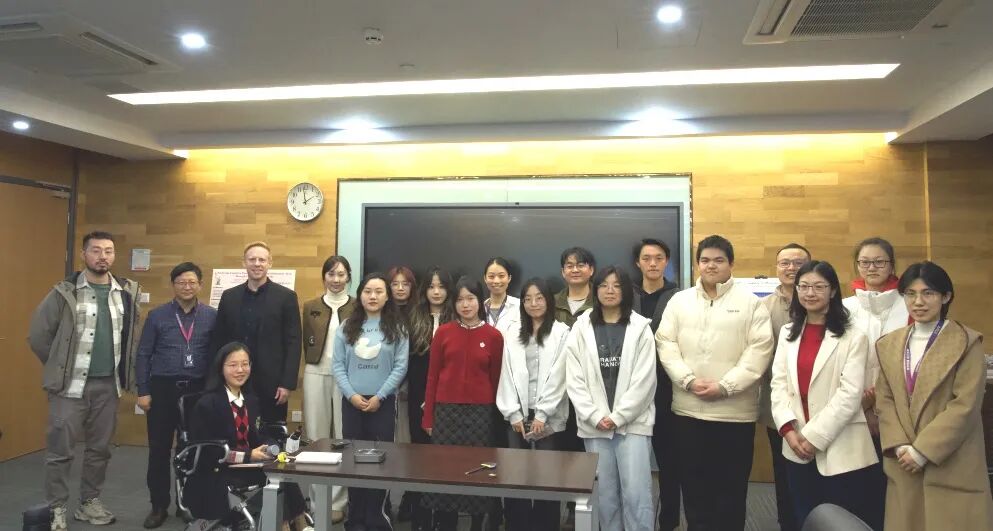
A group photo of staff and students of EQA-TRI project
On 5 December 2024, the closing ceremony of the EQA-TRI project of Xi'an Jiaotong-Liverpool University was successfully held in the School of Humanities and Social Sciences, marking the successful conclusion of this six-month translation project. The project is a collaboration between the Education and Quality Assurance Office at Xi'an Jiaotong-Liverpool University and the Department of Literary and Translation Studies in the School of Humanities and Social Sciences. This project was tasked with translating 21 school policy guides from English to Chinese, with a total of 122 pages.
The Department of Literary and Translation Studies at XJTLU is committed to bridging the gap between academia and practice, combining research with practical training in translation. “This project is not only about translating official documents for the University ,” Dr.Wan Hu, Head of the Department , emphasized in her opening speech, “It is also an immersive experience that allows our students to get close to the daily workflow of translation in the digital age.”
At the beginning of July this year, the Department of Literary and Translation Studies at XJTLU announced the recruitment of interns for the EQA-TRI project team. A total of 10 undergraduate students were selected to participate in the translation project. In addition, three faculty members from the BA Translation and Interpreting programme and two doctoral students also participated in the project. Among them, Siyu Chen, a translation and interpreting teaching lecturer, is the leader of this project, and Boyi Huang, an assistant professor, is jointly responsible for the preliminary review of the translation, and Dr Zhiwei Han, Programme Director for the BA Translation and Interpreting programme, is the chief reviewer of terminology and translation. Two PhD students, Ms.Hui Jiao and Ms.Yuxin Deng, led the interns to carry out translation research activities as project team leaders.
The first task of the project was to build a terminology database. Termbases are the key to the success of a translation project, helping translators find precise definitions and names of relevant terms when the translated content involves areas of expertise. After the terminology retrieval training of Dr Zhiwei Han, the students created 562 term entries for this project. During the translation process, Siyu Chen and Dr Boyi Huang instructed the students to build a translation memory and store the translated sentences, paragraphs or text segments in the database so that they can be reused in the translation to improve work efficiency and consistency of the translation. More than 2,600 entries have been created in this project.
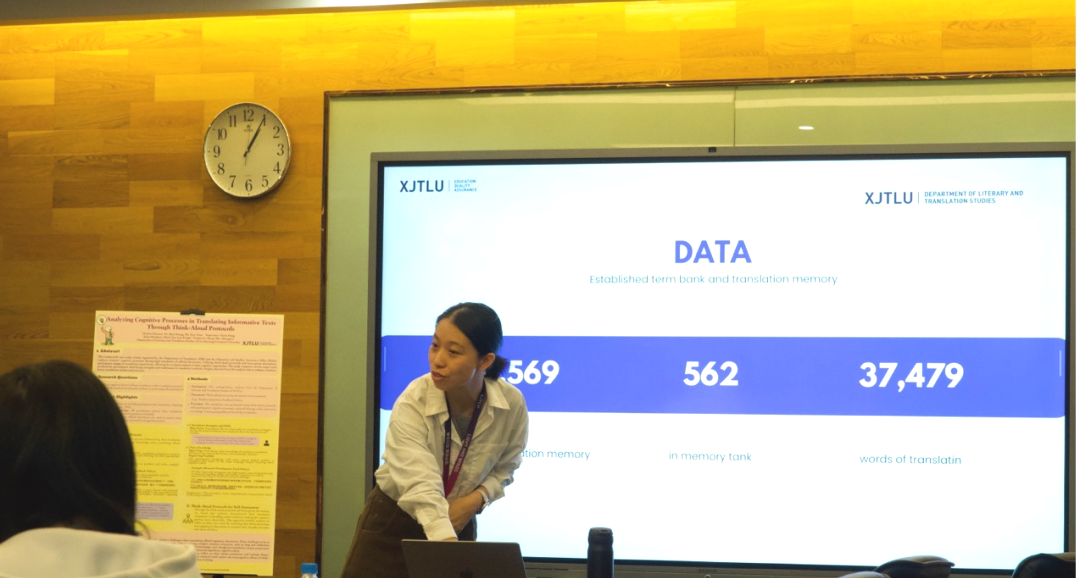
Ms. Siyu Chen is introducing the results of the project
Subsequently, the students officially started their translation work under the supervision of the teaching team . According to Zheni Yan, a third-year BA Translation and Interpreting student, the content of the translation is mainly related to XJTLU's education policies, such as the SURF (Summer Undergraduate Research Program) Staff Guide and student policy documents. “I had never been involved in translating policy documents before, and this project was a very new experience for me.” Xiaoyi Ma, a sophomore from BA Translation and Interpreting, shared.

Students being interviewed
The translation process also comes with many difficulties and gains. Jiatong Li, a third-year translation pathway student, said that the biggest challenge was to work on the translation of proper nouns: “For example, ‘final year project' can be translated into a graduation project or a graduation thesis. We need to constantly figure out the context and analyze it with real-life examples to decide which interpretation to choose. ”
At the same time, the students' ability to work together has also been significantly improved in this project. “We are not only translators, but also project managers.” so said the students. The 12 students took on different roles such as translator, proofreader, and group leader. In the weekly group meeting, everyone would discuss the problems encountered in the translation process and jointly promote the progress of the project. One of the proofreaders said, “As proofreaders, we often need to discuss and negotiate with the translator and the team leader. In many cases, it is not the translation itself that is wrong, but more of a gathering to find a translation that is more appropriate to the text and context.” Learning to respect the translation results of others, express one's own opinions, and cooperate and negotiate with others is a valuable gain for students in addition to translation skills.
After completing the translation task, the students reviewed and reflected on their translation process and presented their academic research results at the closing ceremony.
The first group explored the impact of Think-Aloud Protocols on the cognitive processes of translation students. Think-Aloud Protocols method asks project participants to articulate their thought processes and analyze the translator's thought and cognitive process by recording audio and video recordings and then transcribing them into written text. The students found that this method can effectively improve their translation abilities and translation strategy skills, assisting them to translate works that are more in line with language norms and more in line with the language style of legal documents.
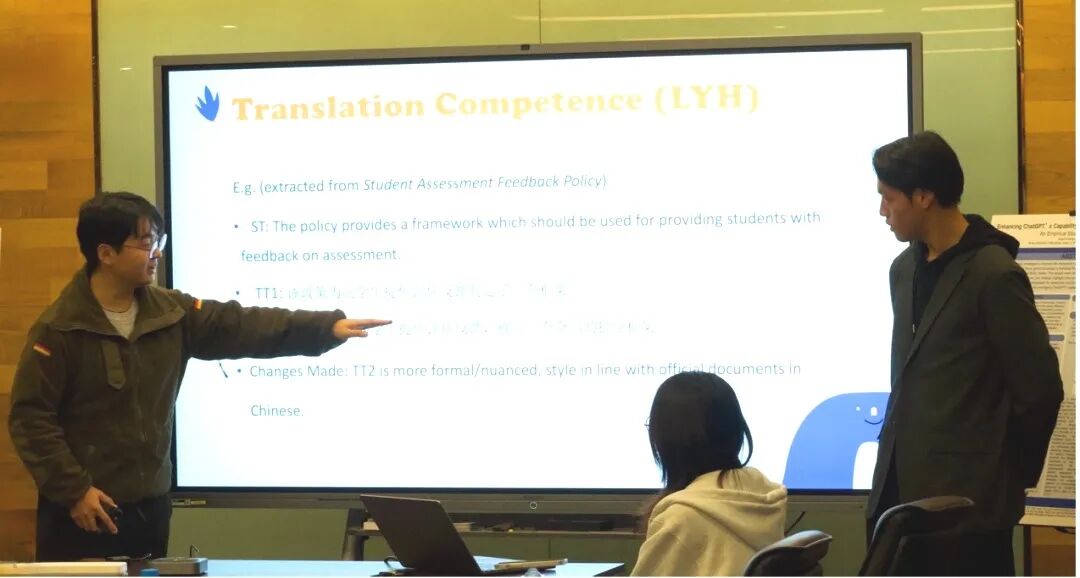
The first group of students is presenting their research results
In addition, students will review their audio thinking data and compare the thought processes of different translators in order to reflect on their own work and improve their translations. Several instructors believe that the study has allowed them to understand the thought processes and inner feelings of students when translating. This window into the cognitive mechanisms of translation is often overlooked, but it is crucial to understanding how the translated work is done.
The second group conducted a study on large language models. The students selected the “Surf Faculty Guide” as the translation material and provided ChatGPT with three different levels of prompts to explore how the quality of the prompts affects ChatGPT's translation results. By comparing and analyzing the evaluation data of the BLUE index (Comparative Translation Quality Evaluation Index), the students in this group found that when the prompts provided by the translators are more detailed and situational, the translation results of ChatGPT are more accurate and specific and more in line with the text context. The project advisors of the BA Translation and Interpreting programme fully affirmed the students' research results. They pointed out that in this era of deep integration of technology and the translation industry, translation students have effectively tested the translation ability of large language models in this practical project.
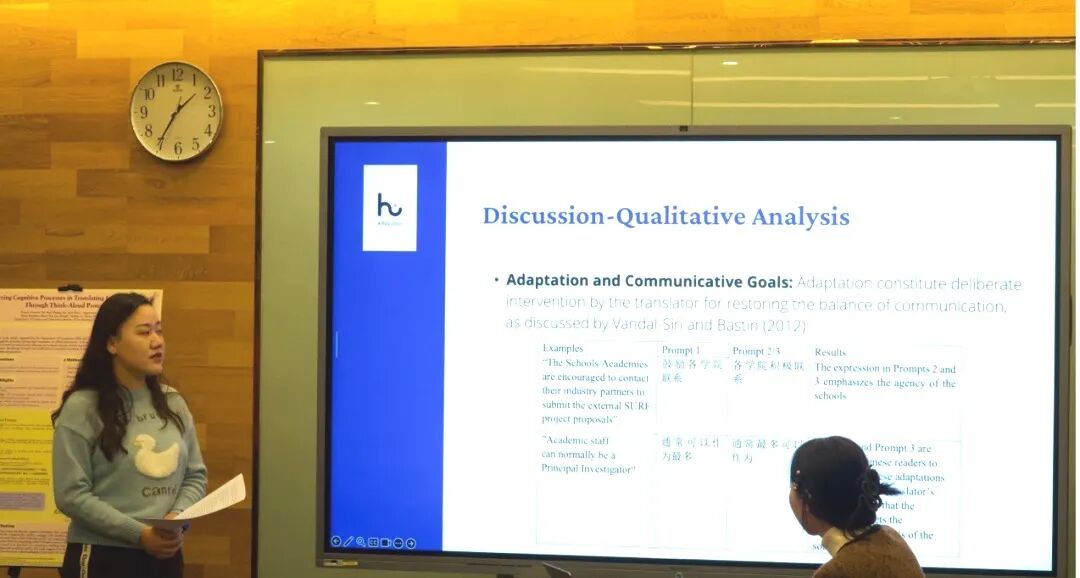
The second group of students is presenting their research results
After the presentation, Ms. Dan Chen from XJTLU's Education and Quality Assurance Office delivered a speech, emphasizing the importance of the policy to Sino-foreign joint universities, and expressing her sincere gratitude to all teachers and students who participated in the project.
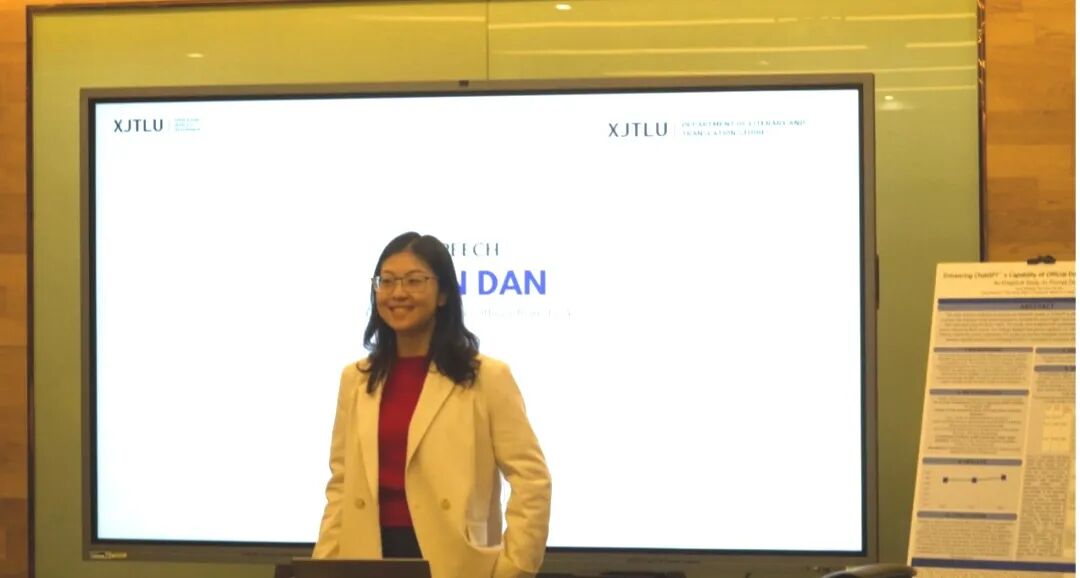
Ms. Dan Chen is delivering a speech
Dr Tom Duggett, Associate Head of the Department of Literary and Translation Studies , also pointed out in his subsequent speech that policy is the compass of an institution, and if we don't know where we are, we can't predict where we will go. At the same time, Dr Duggett expressed his affirmation and praise for the translation results of the project: “Thank you to every student and teacher who participated in the project, your efforts are giving new life to the school's policies. ”
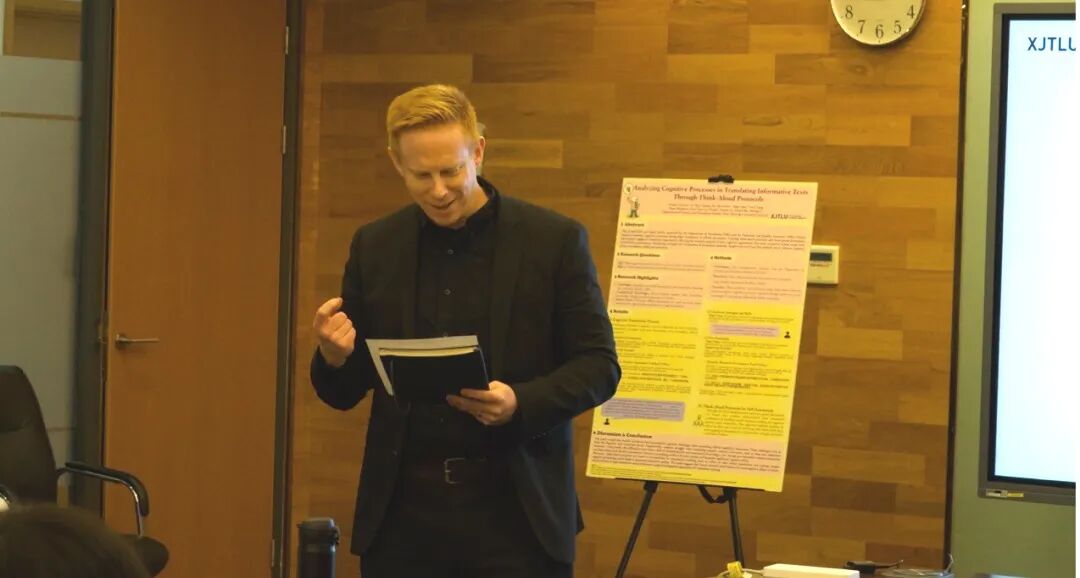
Dr Tom Duggett is giving a speech
Finally, Ms. Dan Chen and Dr Tom Duggett presented awards to the students and teachers who participated in the project.
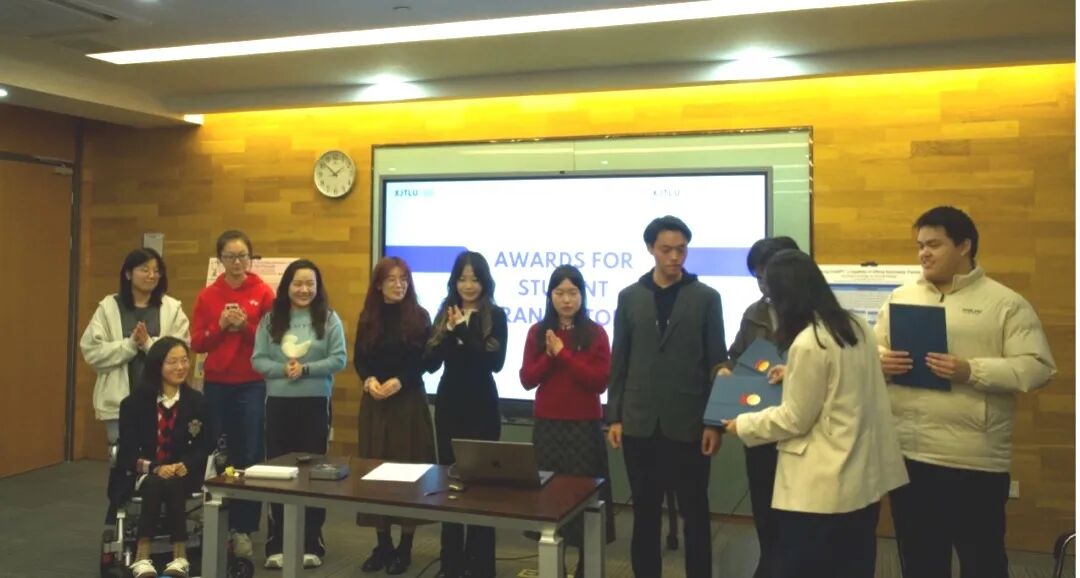
Ms. Dan Chen is presenting awards to the students
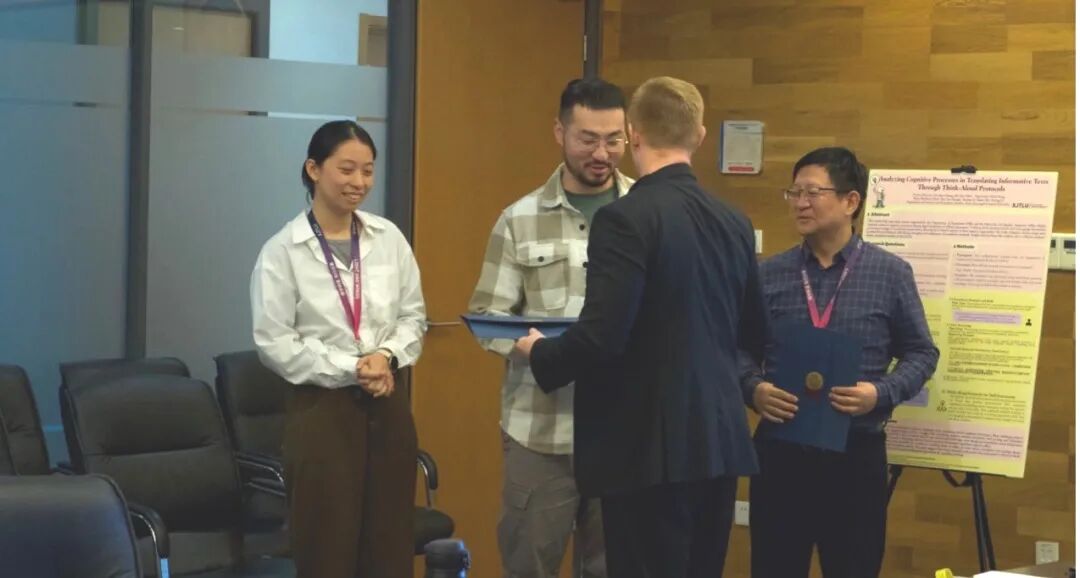
Dr Tom Duggett is presenting the award to the instructor
The EQA-TRI project is a collaboration between the administrative department and the academic department, and it is also a fusion of translation practice and academic research. “Translation is not just about changing words from one language to another; It's about understanding, communication and connection. It's a bridge we've built together.” Dr Wan Hu said.
Reporter: Sirui Zhong
Photo: Chenfei Song
Editor: Yiyi Gu, Zhiwei Han
18 Dec 2024








